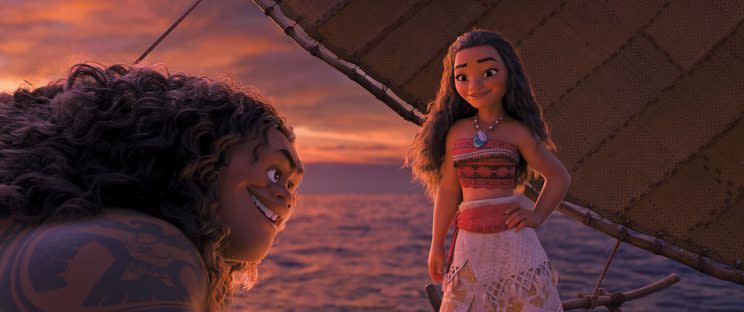Why 'Moana' Is the Movie We Need Right Now

Usually, I love writing about pop culture. Right now, not so much. Since the election, the stakes for every action seem impossibly high: Democracy and freedom of the press are in peril, and I’m writing about movie trailers. Am I encouraging escapism at exactly the time when people need to be present? A lot of entertainment journalists are asking themselves these kinds of questions right now, and I know I’m not the only one who considered skipping the press screening of the Disney princess movie Moana earlier this month. But I’m glad I didn’t. At a time when I was feeling bad about the state of America, Moana — which opens in theaters today — reminded me of everything that makes this country special.
I know, I know: Disney is a giant corporation and Moana is a cunningly designed cog in a marketing machine. But Disney princess movies, as much as they’re a multibillion-dollar business, are an American tradition, starting in 1937, when Walt Disney pioneered the full-length, hand-drawn animated feature with Snow White. As the years have gone by, the films have become even more quintessentially American, with their plucky can-do heroines, fierce optimism, and songs by Broadway composers (musical theater being another great American art form.)
Related: It’s Time to See ‘The Little Mermaid’ as a Feminist Film
Moana is not an explicitly American story. Its lead character is the chief’s daughter on a fictional Polynesian island (not Hawaii, which would make it American), who takes to the sea to fulfill a mythical quest. Disney fairy-tale films have always borrowed from other cultures — sometimes subtly, like the European fables that inspired Snow White and Sleeping Beauty, and sometimes problematically, like the Middle Eastern stereotypes that cast a shadow on Aladdin. But the homage has never been so loving as it is in Moana, which was created in collaboration with a group of Pacific Islands experts dubbed the Oceanic Story Trust.
I can’t personally speak to the accuracy of the film’s Polynesian setting, only to how thrilling it was to dive so deeply into a culture, setting, and mythology I’ve rarely seen on film. The film’s emotional depth was just as striking; along with the rest of the audience in attendance, I sniffled my way through Moana’s journey and was deeply stirred by the film’s big, open-hearted ballads. (Whichever side of Hamilton-gate you landed on, you have to admit that composer Lin-Manuel Miranda can write a song.) And for the first time since the election, I laughed with genuine delight. (Oh, Heihei, you silly, silly rooster.)
Related: She’s No Princess: How ‘Moana’ Continues the Evolution of Disney’s Animated Heroines
Watching the remarkable way the film portrays the Pacific Ocean, I was struck by how much the animators owed to the legendary Japanese artist and director Hayao Miyazaki, whose film Ponyo also made a living character out of the sea. This inclusiveness is part of Disney’s magic, and one of the reasons that its animated films are a worldwide box-office draw. In this case, Disney went the extra mile, not just employing the Oceanic Story Trust, but hiring actors (Auli’i Cravalho, Dwayne Johnson, Tamuera Morrison) and some key creatives (original screenwriter Taika Waititi, co-songwriter Opetaia Foa’i) who have Polynesian roots. Films like Moana speak to the United States’ embrace of diverse cultures, the idea that we all have a role to play in its history, and that drawing inspiration from other nations makes us better.
A big part of my own emotional reaction to Moana was how fully realized the heroine is and how confidently she embraces her journey. The Disney movies I watched as a small child starred passive, fragile princesses, pining for love in front of an audience of forest creatures. As I got older, princesses like Ariel and Belle began to grow spines and read books, but didn’t really get to be the heroes of their own stories. However, my infant daughter will get to grow up with Moana: a girl who rejects the “princess” label, who fights for what she believes in, who doesn’t give a second thought to romance, and who has aspirations and skills beyond singing ballads to chipmunks.
This is not a small thing if you believe, as I do, that the stories we love shape who we are. We may not have elected a female president yet, but it gives me a shot of hope that my daughter’s first heroes will be the complicated girls of the current Disney era, who aren’t afraid to be leaders and explorers (like Moana), to feel their own feelings (like Inside Out’s Riley), and to let their least socially acceptable qualities shine (like Elsa in Frozen). Even better: Disney films cut across all demographics. Moana doesn’t just belong to my blue-state daughter; she belongs to kids in Texas and Kentucky, in Japan and Venezuela and the Ukraine.
A little escapism once in a while is healthy, but movies aren’t ever purely about escape. A good film is still one of the most effective ways to open hearts, challenge old ideas, and create empathy for people we otherwise wouldn’t understand. Moana is a children’s film with a rapping demigod, but its strong heroine, its embrace of cultural diversity, and its level of artistic accomplishment all speak to something deeper. There’s a reason that Hollywood is nicknamed “the dream factory.” At a time of deep rifts in our nation and world, we need a dream like Moana.
Watch a video about the voice behind Moana:

